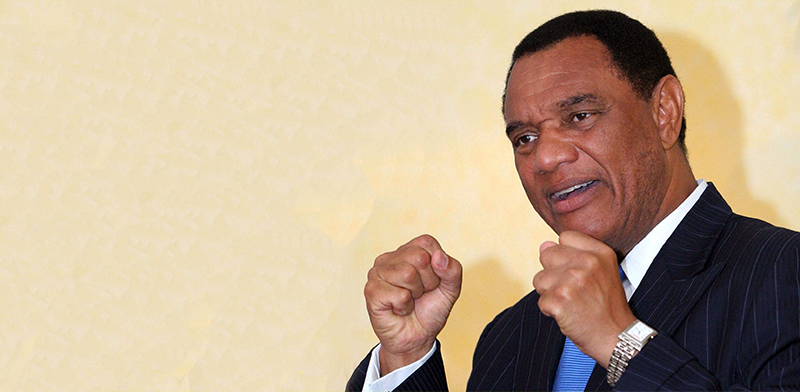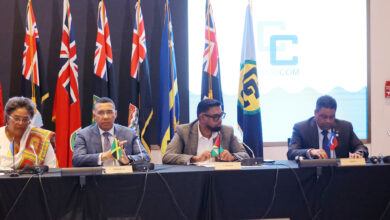KINGSTON, Jamaica, Jan 20, CMC – Bahamas Prime Minister Perry Christie says the key to the Caribbean achieving economic growth and development will be its ability to “think strategically and collaborate”.
Addressing the Regional Investments and Capital Markets Conference 2016 Trade Show organised by the Jamaica Stock Exchange on Tuesday, Christie said with a collaborative, strategic approach “we can position this Region as one of excellence in governance, one where there is a highly skilled and well-educated workforce, and one possessing the infrastructure and technology to facilitate economic development in the 21st Century and beyond”.
He said the theme of the conference ‘Reaching Beyond Traditional Boundaries – Exploring & Partnering for Growth for All’ is both timely and appropriate as Caribbean countries still struggle to overcome the economic fallout of the Great Recession of 2008.
He said in positioning the Caribbean on the international arena, the ultimate goal must, of course, be the betterment of its peoples, in terms of their economic and social well-being.
“In today’s markets, defining and implementing a successful brand-positioning strategy in a rapidly changing business environment can be challenging to say the least.
“The phrase ‘Think globally, act locally’ broadly summarises the approach we must take to the development of strategies which will be effective at achieving the objective of improving the well-being of our citizens.”
Christie said that the World Bank Group’s ‘Ease of Doing Business’ 2016 Fact Sheet for the Caribbean, showed Regional economies have an average ranking of 108 out of 189 countries with Jamaica, Saint Lucia and Trinidad and Tobago among the highest placed Caribbean countries.
“It is a truism that only through the implementation of positive reforms can nations hold their place or move up on this index. And make no mistake about it: the perception of a country’s ‘ease of doing business’ is of critical importance when governments are seeking to improve economic conditions and court investors,” Christie told the delegates, adding “it is therefore vitally important that we improve our respective business environments and increase the Region’s overall attractiveness”.
He said the need for good governance is widely recognised in discussions on economic development and that “one of the most important areas of good governance that governments in the region must effect is legal frameworks that are enforced fairly and impartially.
“The enforcement of the rule of law and protection of property rights and fundamental rights of citizens has an important bearing on economic development. Protection of human rights, particularly those of minorities, and the timely, effective and corruption-free enforcement of laws require an independent and incorruptible judiciary and police force.”
Christie said that experience has shown that some of the most important factors considered by investors as they decide on investment location include a predictable and non-discriminatory regulatory environment and the absence of undue administrative impediments to business.
“These are areas that must be closely monitored and continuously improved upon to attract and sustain higher investment flows. At the same time, policy makers must always be flexible and forward looking.
“In particular, we must avoid becoming stuck in modalities of governance that the rest of the world is moving away from. Good governance requires policy and laws to be in sync with current realities and in step with generally accepted global norms.”
The Bahamas Prime Minister said that investment and economic growth will depend among other things on the quality of the business environments that the region is seeking to establish, the overall set of policies that affect the starting and running of businesses, and how they are implemented and managed.
“To be thriving jurisdictions in the global arena, we must invest in modern legislation and procedures which result in sound business practices. In this regard, I declare that my government in The Bahamas, as should all governments in the region, is committed to building an economic environment in which free enterprise can flourish.”
He said the Caribbean is well aware that the global financial architecture is under review and that global policy measures and initiatives are directly affecting the Caribbean and rules, norms and standards are changing quickly.
“Investors are looking for the confidence that our industries are well regulated and meet international standards. As a Region, we must understand that we must meet the challenges of regulating in a globalised environment. We must all adopt responsible policies and encourage Regional growth and global competitiveness through adherence to internationally accepted regulatory principles, and efficiency in their administration.”
Christie said that many Caribbean countries were now engaged in the export of services – both financial and general business services – as a means to grow their economies and to provide modern opportunities to their citizens.
But he said the Caribbean countries are increasingly challenged to remain competitive through repositioning their industries within the context of constantly evolving international standards.
“The need for innovation is a cornerstone of the future success of our region. The ongoing survival of the Caribbean’s international financial services sectors may necessitate the creation of new products, targeting new markets and moving towards further specialisation.
“We will need to continually reinvent ourselves to meet new challenges if we are to successfully compete and survive in the international arena,’ Christie said, adding that as the Regional leaders contemplate positioning the Caribbean in the international arena, they must recognise that good governance, a friendly business environment and innovation are only a part of the equation.
“No nation will realise its full economic potential with a workforce that does not have the requisite skills and education to be productive contributors to development and to be engaged as full participants in society.
“Fundamental to the positioning of the Caribbean must be an emphasis on a workforce that is, both in fact and perception, an excellent value – appropriately educated, skilled for their functions, healthy and functioning in a safe environment.”
He said this need is underscored as Caribbean countries look to improve employment opportunities for their citizens, not only through job creation, but also through attracting higher paying jobs.
He said while the tourism industry has, in the case of The Bahamas, been the key pillar undergirding the economy for more than 60 years, the contribution of financial services to the transformation of The Bahamas into a modern economy cannot be understated, particularly in its contribution to the expansion of the middle and upper classes over the past five decades.
In his address, Prime Minister Christie said that most Caribbean countries take energy for granted.
“The lights come on when we want them to and it’s not given a second thought. However, the Caribbean has some of the world’s highest energy costs. This is mainly the result of our Region’s over-dependence on imported fossil fuels, which are subject to high price volatility.
“For example, electricity prices in the Caribbean are about three times those in the United States. This raises immediate concerns about the global competitiveness of our businesses and sustainable economic growth and development.”
Christie said that to position the Caribbean as a global economic player, it is essential the region haas access to affordable energy.
“Some countries in the region have made noteworthy strides in transforming their energy sectors. Trinidad and Tobago, our Region’s major oil producer and net hydrocarbon exporter, has prepared draft policies for renewable energy and energy efficiency, and also developed incentives for renewable energy and energy efficiency interventions.”
He said the decline in the global price for oil is welcomed by net energy importing countries, “however, we must not be distracted as the global price of oil fluctuates greatly.
“We must remain committed to tapping into sustainable, inexpensive energy sources and becoming energy secure,” he told the conference.






